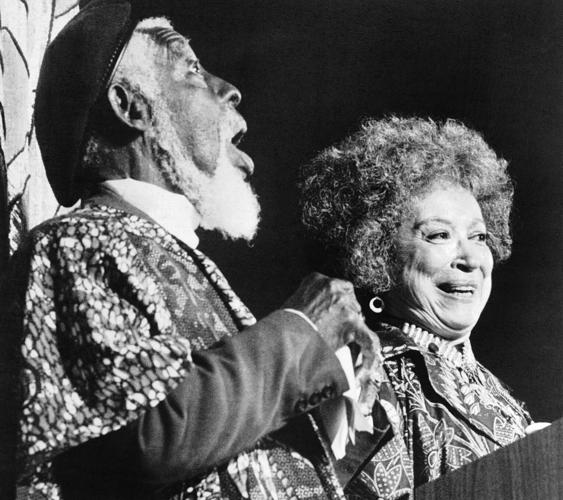This Post and Courier article by Benjamin Simon was originally published on March 27th, 2024. Photo: Associated Press
GREENVILLE — In 1955, a Charleston native almost became the first Black woman to write a play for Broadway, and all she had to do was write a more-upbeat ending.
But Alice Childress refused to water down “Trouble in Mind,” her play about racism and sexism in the theater industry, so by the time of her death in 1994, none of her works ever made it.
Now, in Greenville, Childress is finally receiving the recognition that eluded her.
From March 29 to April 14, downtown Greenville’s Warehouse Theater will pay homage to the South Carolina great, performing “Trouble in Mind” across three weekends.
“It’s crazy that the conversations in the play feel so contemporary still that we’re having similar conversations about race and about entertainment,” said Mike Sablone, Warehouse’s producing artistic director.
Sablone specifically chose to honor the classic play during Warehouse’s 50th anniversary season, one of the oldest theaters in Greenville and known for its cutting edge shows that weren’t afraid to attack issues of race or sexuality.
After moving to the West End in 1998, it has become a staple of the revitalized downtown area, long before tourists flooded the sidewalks and the lights of Fluor Field lit the sky over it.
If the theater wanted to honor its 50th year, Sablone knew that it needed a South Carolina playwright.
From Charleston to New York City
Childress was born in Charleston in 1916 where her father worked in insurance and her mother worked as a seamstress. After her parents separated, she moved to New York City at age 9 to live with her maternal grandmother, Eliza White, who was originally from Charleston.
“Even though she lived in Harlem, she never really left Charleston,” she said of her grandmother to The (Charleston) News and Courier in 1990. “She and her friends used to meet on weekends, especially after church, and talk about nothing else. Charleston’s streets. Churches. People.”
Childress never attended high school or college, but rose through the ranks as an actor at the American Negro Theatre, the historic Harlem-based theater for Black artists. To make ends meet, she juggled mismatched jobs as a domestic worker, photo re-toucher and insurance agent.
After leaving acting, she transitioned into playwriting in 1949, producing “Gold Through The Trees,” the first all-union cast of a play by a Black woman in New York.
Though she left South Carolina at a young age, her birthplace was seeped into her work. She wrote “Florence” about a Black protagonist from South Carolina and “A Sea Island Song” about the Gullah culture of the Sea Islands.
But one of her most-famous pieces came in 1955 with “Trouble in Mind” about an integrated cast performing an anti-lynching production called “Chaos in Belleville,” written and directed by White creators.
As the fictional “Chaos in Belleville” progresses, the main character Wiletta, a Black woman, leads the mostly Black cast as they push back against the show creators’ racism and stereotypical characters.
The play earned widespread praise, carefully weaving humor without losing the weight of the story, described by NPR as “both a love letter and a poison pen letter to the theater.”
“Every character in here is starting out with the best of intentions, like ‘oh, yes, we’re doing this quote unquote, radical piece of work,’” said Amanda Washington, who will direct the Warehouse show. “Then by the end, Wiletta Mayer has really shined light on all of the problems in the script.”
At the time, Childress was one of few Black playwrights to have Black characters challenge White characters, said Kathy Perkins, a scholar who previously worked with Childress and edited anthologies about her productions. It won an Obie for best Off-Broadway play, the first Black woman to do so.
Before it reached Off-Broadway, though, White producers threatened to cancel if she didn’t change the title to “So Early Monday Morning” and create a happier ending of racial reconciliation.
Childress agreed. But the decision ate at her.
When it was optioned to Broadway not much later, producers demanded more changes. This time, Childress declined, scraping the more-upbeat ending altogether and returning to her initial script — losing her chance at theater’s brightest lights along with it.
Four years later, Lorraine Hansberry became the first Black playwright for “A Raisin in the Sun.”
“I have deep respect for that,” Washington said of Childress’ decision. “Having her play put on Broadway could have changed the entire trajectory of who we talked about in Theater 101.”
Before she died in 1994, Childress would go on to write over a dozen plays, many with all-Black casts, and acclaimed novels, including “A Hero Ain’t Nothin’ but a Sandwich.” She was inducted into the South Carolina Academy of Authors and received countless national awards for her literature.
While “Trouble in Mind” was scarcely performed professionally, in 2021 it was finally revived for Broadway — without a word changed from her original script.
The limited run at Times Square’s Todd Haimes Theatre was nominated for four Tony Awards, underscoring how it resonated with viewers long after it was first written.
“It’s a great reminder of look how far we’ve come,” Washington said, “but also look how far we have not come, and we still have work to do.”
Back in her home state
After starting at Warehouse in 2017, Sablone went searching for South Carolina playwrights — and found Childress. He was “mortified” that he had never read her work before.
He was drawn by the range of roles that “Trouble in Mind” offered, for people both Black and White, for people in their 20s and some in their 60s.
But most of all, he wanted to highlight a play written by a Black woman with a Black woman as the protagonist.
Clark Nesbitt, who will play Sheldon Forrester, runs a theater company, No Dreams Deferred, that focuses on bringing the works of Black artists to the Upstate.
“I don’t think that a good number of people know that she’s from South Carolina,” he said. “Or that she’s Black. Or that ‘Trouble in Mind’ is a Black play. Hopefully some people will see it and it will be a continuing to want to explore other works by other artists.”
Long after she left South Carolina for New York City, Childress still considered herself a Charlestonian.
“There are great dramatists anywhere,” Sablone said. “They don’t have to be just from New York City, or just from Los Angeles. The truly great writing knows no boundaries.”




